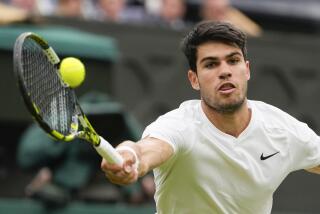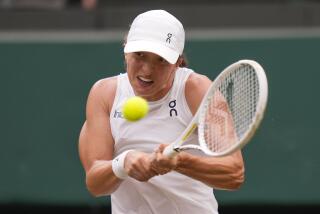Playing on the edge, Venus rallies to win
- Share via
WIMBLEDON, ENGLAND — Ten years after Venus Williams debuted here at a rising 17 with purple-and-green hair beads and the fresh scars of algebra, she appeared here Tuesday at a waning 27 with a staid white visor and fresh worries of geometry.
Mistakenly channeling her inner Hank Aaron, she pummeled enough groundstrokes long, and felt enough puzzlement as to why, to trail 6-2, 2-0 and love-30, to another of the Russian masses charging up the women’s tennis charts.
This time, Alla Kudryavtseva, 19 and ranked No. 59, would be the teenager playing a Wimbledon debut match.
But as Williams lost that 1997 first-round match by 4-6, 6-2, 6-4, because she had no idea what to do with Magdalena Grzybowska’s backhand, Kudryavtseva lost this shrieking melodrama by 2-6, 6-3, 7-5.
Why? Well, because of everything that’s happened the last 10 years.
For one thing, Williams has won three Wimbledon titles, so she knows how to self-correct on the fly. For another, Kudryavtseva got irked with some line calls, took a ball and smashed it into the back wall at the end of the penultimate game, so that she wound up exiting crestfallen, all freckles and tears.
For another, Williams’ family has gone from 1997 novelty to 2007 first family of tennis, and the first family of tennis can give quite the boost on snug Court No. 2, that Wimbledon court allegedly most accursed.
So as Venus Williams dug halfway toward purgatory, Serena Williams sat three rows up from the action, next to their mother Oracene and across the aisle from their father, Richard. From her place inside the white hood of her warmup jacket, Serena Williams polished the dour moments with exhortations.
“Stay low!”
“Keep down!”
“Way to look at it!”
And the ever-encouraging: “You got her!”
All the while Serena, herself twice champion here, showed a facile capacity to multitask, looking up from her mobile gadget to shout support, then looking back down, her red nails darting about ferociously in a slew of possible text-messaging.
“I definitely listened,” Venus Williams said. “I mean, at one point, I was like, ‘The ball’s flying, what am I doing?’ Sometimes you just need that support.”
Her mother chimed in sometimes with, “Go V!” and, “Fight!” Her father watched quietly, and later said, “All I saw her look at was Serena. I didn’t see her look at me. One time, maybe. I think Serena helped her a great deal.”
Of course, he’d walked out at 2-6, 5-2, waving to the tennis star-maker Nick Bollettieri as the latter teased him about needing a smoke.
He went for food, returned for the last game, which Venus Williams served out at love, then he treated a small crowd to a treatise on the search for new greatness in American tennis. He said the search must lean toward the impoverished because there would lie a will to succeed.
“If there’s anything coming through America, it’s not going to come from the Chris Evert Tennis Academy,” he said, stressing it’ll come from “the ghetto.”
He said likewise for England, as the motherland and the colonies slog through another Wimbledon rife with questions of national tennis malady.
The U.S., with zero quarterfinalists in the 2006 Wimbledon for a failure unprecedented since 1911, has seen its 14 American men pared to three in one round -- Andy Roddick, James Blake and Amer Delic. At least it has seen the proving of Blake’s French Open prediction that American men would not go winless at Wimbledon.
“It helped when I saw Roddick versus Gimelstob in the first round,” Blake cracked Tuesday. “I knew we couldn’t go. I was safe.”
He, too, had to multi-task, winning impressively over Igor Andreev, 6-3, 6-4, 6-4, and offering geopolitical defense of U.S. tennis.
“Last year at Shanghai, there were only two countries that had two players in the Masters Cup, us and Spain,” he said. “It seems like there really aren’t very many countries that can say they have two top-10 players, top-20 players even, because the sport has become so global.”
To guarantee one of your players will appear in the second week of every Grand Slam, he said, you pretty much have to hail from Switzerland.
English fans long since felt the global brunt, but they inhaled a whiff of nostalgia on Tuesday when Tim Henman finished off his suspended battle of geezers with Carlos Moya by winning a riveting fifth set by 13-11 when Moya double-faulted on Henman’s sixth match point.
That prepared the country for another day of heart-of-Henman poetry, plus expectations of a run by the old grass-court codger.
“It’s a difficult one, expectation, because everyone is saying I should retire,” he said. “But then they ask me how I should do, and they expect me to get to the second week. But it’s like, if you expect me to get to the second week, why do you want me to retire?”
That seemed to conclude the epics for the day, but then around suppertime Williams got going. Ten years from a debut when she couldn’t figure out what to do, she remedied herself Tuesday by sort of reconstructing her game out there.
“I enjoy the battle,” she said.
“If you want to be successful at anything it doesn’t come easy,” she added, sounding very much 27.
More to Read
Go beyond the scoreboard
Get the latest on L.A.'s teams in the daily Sports Report newsletter.
You may occasionally receive promotional content from the Los Angeles Times.










